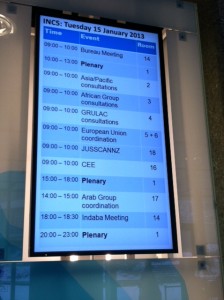by Julie van der Hoop
It’s Day 3 of the INC5 negotiations. By now, we’ve all become a bit more familiar the format of proceedings. However, our schedules are becoming more and more fluid as plenary sessions devolve into contact groups, which can have much more unpredictable (read: long) hours.
Contact groups are sessions that occur at the same time as plenary, where countries and observers discuss a particular subject of interest. These sessions are less formal than plenary, and are usually in English only (stay tuned to the blog about interpretation at the UN!). Here at INC5, the Chair has established contact groups to edit particular articles and subsections of the treaty.
That being said, today’s agenda doesn’t explicitly list any contact group meetings. Yet. (I wouldn’t be surprised if the first contact group meetings begin right after lunch, if not before).

Today is the day that we will have one of the negotiations’ biggest questions answered: what is a Swiss break? We’ve been invited by the host country to enjoy their hospitality over dinner hours, 18:00 – 20:00. But what will this Swiss break entail!? Stay tuned for Alice’s daily wrap-up blog, or follow us on twitter @MITmercury or at #MITmercury to find out.
Interested in particular aspects of the treaty discussions? @alicealpert and I (@jvanderhoop) will be covering continued discussions on technical and financial assistance. @Bea_Edwards and @lncz are staying late in the night for work on products and processes, and @markdstaples and @DanyaRumore are summarizing ASGM, supply, waste and trade. Check out @wolfeyp and @amandagiang for more general discussions on institutions and implementation!

What did I tell you? The schedule changed within the first 30 minutes of plenary. This morning, three contact groups were established for “selected technical articles” (i.e. products and processes), “emissions thresholds”, and for “Friends of the co-chair on the contact group of technical assistance and technology transfer.” These “Friends of the chair” groups are meetings between chairs and specific Parties that expressed specific feelings in the initial contact group.
Time for another round of plenary – who knows what other contact groups will be formed!
Interesting! Are there major economic interests who oppose mercury regulation at the global level? Do these organizations have any standing or presence at the conference, or are their concerns mainly communicated through receptive national governments?